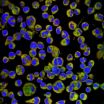(Press-News.org) The first comprehensive study of captive black rhino reproduction in Europe highlights how hormone analysis could improve the success of breeding programmes.
Researchers from Chester Zoo, The University of Manchester and the University of Liverpool carried out a six-year study which encompassed 90% of European population of black rhino.
Dr Katie Edwards led the research as part of her PhD at the University of Liverpool. She says: "Although some black rhinoceros breed well in captivity, not all do therefore reducing the vital genetic reserve that these populations represent. This species is of high conservation importance, so understanding what could be limiting breeding in certain individuals and how we could make improvements is a priority."
In total 9743 samples from 11 zoos were sent to Chester Zoo's Wildlife Endocrinology laboratory to analyse female reproductive cycles.
Dr Edwards says: "Our analyses showed that females who had never bred were more likely to exhibit irregular oestrous cycles, indicating that underlying physiology is involved in differences in breeding success."
Dr Edwards continues: "As well as non-breeding females not cycling as reliably, behavioural observations showed us that these females don't necessarily show when they are ready to mate, which can make managing breeding difficult. Hormone analysis helps address this problem by allowing us to predict when a female will be sexually receptive to a male, even if she doesn't make it obvious."
Hormone analysis has been successfully used at Chester Zoo which has seen three births in the last three years.
As well as looking at hormone analysis, the researchers also investigated a number of other factors that could affect breeding success.
Females that had never bred were found to be heavier than those that had, demonstrating that maintaining a suitable diet in captivity can play an important role in the success of breeding programmes.
Non-breeding females were also found to be more unpredictable in their overall temperaments.
Dr Susanne Shultz from the Faculty of Life Sciences at The University of Manchester was the academic supervisor for the project. She says: "This research highlights how rhinos can behave in a different manner despite being kept in similar conditions. We think this demonstrates that it is important to recognise individual differences and adjust management plans accordingly to maximise the health and reproduction across all individuals in the population."
Dr Sue Walker, Head of Applied Science at Chester Zoo, oversaw the project. She concludes: "Poaching in the wild is a serious threat to the rhino; therefore it is important for us to understand the factors that can influence reproductive success. We established the project to understand why some individuals breed well, while others do not. The idea is that with a better understanding of factors that affect reproduction, we know where we should be focusing our efforts to support the European-wide breeding programme for this critically endangered species."
INFORMATION:
The results of the study have been published in the Journal of General and Comparative Endocrinology.
Hormone analysis helps identify horny rhinos
The first comprehensive study of captive black rhino reproduction in Europe highlights how hormone analysis could improve the success of breeding programmes
2014-08-22
ELSE PRESS RELEASES FROM THIS DATE:
Poll finds many in US lack knowledge about Ebola and its transmission
2014-08-22
Boston, MA – Although the Centers for Disease and Prevention (CDC) reports no known cases of Ebola transmission in the United States, a Harvard School of Public Health (HSPH)/SSRS poll released today (August 21, 2014) shows that four in ten (39%) adults in the U.S. are concerned that there will be a large outbreak in the U.S., and a quarter (26%) are concerned that they or someone in their immediate family may get sick with Ebola over the next year.
The nationally representative poll of 1,025 adults was conducted August 13-17, 2014 by researchers at HSPH and SSRS, an ...
In our digital world, are young people losing the ability to read emotions?
2014-08-22
Children's social skills may be declining as they have less time for face-to-face interaction due to their increased use of digital media, according to a UCLA psychology study.
UCLA scientists found that sixth-graders who went five days without even glancing at a smartphone, television or other digital screen did substantially better at reading human emotions than sixth-graders from the same school who continued to spend hours each day looking at their electronic devices.
"Many people are looking at the benefits of digital media in education, and not many are looking ...
Green tea polyphenols protect spinal cord neurons against oxidative stress
2014-08-22
Green tea polyphenols are strong antioxidants and can reduce free radical damage. Can they protect spinal cord neurons against oxidative stress? Jianbo Zhao and co-workers from the First Affiliated Hospital of Liaoning Medical University, China discovered that green tea polyphenol effectively alleviated oxidative stress and inhibit neuronal apoptosis, indicating green tea polyphenols play a protective role in spinal cord neurons under oxidative stress. The relevant study has been published in the Neural Regeneration Research (Vol. 9, No. 14, 2014).
INFORMATION:
Article: ...
Recombinant adenovirus-mediated DHCR24 inhibits neural apoptosis
2014-08-22
3β-Hydroxysteroid-Δ24 reductase (DHCR24) is a multifunctional enzyme that localizes to the endoplasmic reticulum and has neuroprotective and cholesterol-synthesizing activities. DHCR24 overexpression confers neuroprotection against apoptosis caused by amyloid β deposition. Dr. Xiuli Lu and colleagues from Liaoning University in China constructed two recombinant adenoviruses (Ad-rSYN1-DHCR24-myc and Ad-hSYN1-DHCR24-myc) that drive DHCR24 expression specifically in neuronal cells. They also found that adenovirus transfection inhibits apoptosis through scavenging ...
Smokers consume same amount of cigarettes regardless of nicotine levels
2014-08-22
Cigarettes with very low levels of nicotine may reduce addiction without increasing exposure to toxic chemicals, according to a new study from the University of Waterloo.
The study published in the journal Cancer Epidemiology monitored the smoking behaviours of 72 adults as they switched to three types of cigarettes with markedly reduced nicotine levels.
Unlike when smokers switch between conventional cigarette brands—all of which have very similar levels of nicotine content—the study found no change in participants' puffing behaviour, number of cigarettes consumed ...
Spectacular supernova's mysteries revealed
2014-08-22
New research by a team of UK and European-based astronomers is helping to solve the mystery of what caused a spectacular supernova in a galaxy 11 million light years away, seen earlier this year.
The supernova, a giant explosion of a star and the closest one to the Earth in decades, was discovered earlier this year by chance at the University of London Observatory. These phenomena are extremely important to study because they provide key information about our universe, including how it is expanding and how galaxies evolve.
The new research into its cause, published ...
Citizen scientists saving lives around deadly 'Throat of Fire' volcano
2014-08-22
Citizen scientists are saving the lives of people living in the shadow of deadly volcanoes according to new research from the University of East Anglia.
A new report published today reveals the success of a volunteer group set up to safeguard communities around the 'Throat of Fire' Tungurahua volcano in the Ecuadorian Andes.
More than 600 million people live close to active volcanoes worldwide. The research shows that living safely in these dangerous areas can depend on effective communication and collaboration between volcanologists, risk managers and vulnerable communities.
It ...
Stanford scientists develop a water splitter that runs on an ordinary AAA battery
2014-08-22
In 2015, American consumers will finally be able to purchase fuel cell cars from Toyota and other manufacturers. Although touted as zero-emissions vehicles, most of the cars will run on hydrogen made from natural gas, a fossil fuel that contributes to global warming.
Now scientists at Stanford University have developed a low-cost, emissions-free device that uses an ordinary AAA battery to produce hydrogen by water electrolysis. The battery sends an electric current through two electrodes that split liquid water into hydrogen and oxygen gas. Unlike other water splitters ...
Genetics and lifestyle have a strong impact on biomarkers for inflammation and cancer
2014-08-22
In a new study published in Nature Communications, research scientists from Uppsala University present for the first time a large-scale study of the significance of genetic, clinical and lifestyle factors for protein levels in the bloodstream. The results of the study show that genetics and lifestyle are determining factors for protein levels, a discovery which greatly influences the possibilities for using more biomarkers to identify disease.
Biomarkers used for diagnosing disease should preferably indicate variations in protein levels only for those individuals who ...
Calcium and reproduction go together
2014-08-22
Stanford, CA—Everyone's heard of the birds and the bees. But that old expression leaves out the flowers that are being fertilized. The fertilization process for flowering plants is particularly complex and requires extensive communication between the male and female reproductive cells. New research from an international team from Stanford, Regensburg, Heidelberg, and Munich, and including Carnegie's Wolf Frommer, David Ehrhardt, and Guido Grossmann reports discoveries in the chemical signaling process that guides flowering plant fertilization. It is published in Nature ...
LAST 30 PRESS RELEASES:
Scientists discover why we know when to stop scratching an itch
A hidden reason inner ear cells die – and what it means for preventing hearing loss
Researchers discover how tuberculosis bacteria use a “stealth” mechanism to evade the immune system
New microscopy technique lets scientists see cells in unprecedented detail and color
Sometimes less is more: Scientists rethink how to pack medicine into tiny delivery capsules
Scientists build low-cost microscope to study living cells in zero gravity
The Biophysical Journal names Denis V. Titov the 2025 Paper of the Year-Early Career Investigator awardee
Scientists show how your body senses cold—and why menthol feels cool
Scientists deliver new molecule for getting DNA into cells
Study reveals insights about brain regions linked to OCD, informing potential treatments
Does ocean saltiness influence El Niño?
2026 Young Investigators: ONR celebrates new talent tackling warfighter challenges
Genetics help explain who gets the ‘telltale tingle’ from music, art and literature
Many Americans misunderstand medical aid in dying laws
Researchers publish landmark infectious disease study in ‘Science’
New NSF award supports innovative role-playing game approach to strengthening research security in academia
Kumar named to ACMA Emerging Leaders Program for 2026
AI language models could transform aquatic environmental risk assessment
New isotope tools reveal hidden pathways reshaping the global nitrogen cycle
Study reveals how antibiotic structure controls removal from water using biochar
Why chronic pain lasts longer in women: Immune cells offer clues
Toxic exposure creates epigenetic disease risk over 20 generations
More time spent on social media linked to steroid use intentions among boys and men
New study suggests a “kick it while it’s down” approach to cancer treatment could improve cure rates
Milken Institute, Ann Theodore Foundation launch new grant to support clinical trial for potential sarcoidosis treatment
New strategies boost effectiveness of CAR-NK therapy against cancer
Study: Adolescent cannabis use linked to doubling risk of psychotic and bipolar disorders
Invisible harms: drug-related deaths spike after hurricanes and tropical storms
Adolescent cannabis use and risk of psychotic, bipolar, depressive, and anxiety disorders
Anxiety, depression, and care barriers in adults with intellectual and developmental disabilities
[Press-News.org] Hormone analysis helps identify horny rhinosThe first comprehensive study of captive black rhino reproduction in Europe highlights how hormone analysis could improve the success of breeding programmes







